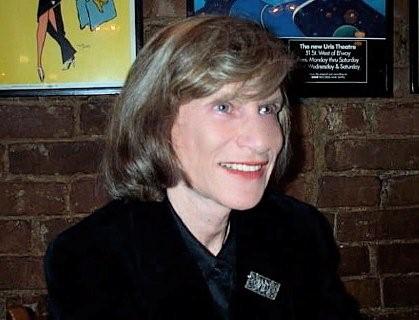Carole Stone
I chose to write my poem "Epithalamion" as a vlllanelle after a friend asked me to write a poem for her cousin's engagement party.With its rhyming pattern and line repetition, this structure seemed fitting for a public occasion. In a sense I was marrying two traditions, the epithaliamion, a marriage form, to the villanelle. I liked this touch of irony which helped me make sure the poem would not be sentimental. If anything I think it turned out to be anti-sentimental which ultimately was what I wanted. A marriage poem with a note of caution!
The ghazal is a Persian form which I learned about from the poet Agha Shahid Ali. The rhyming couplet and the end rhyme attracted me because, as the ghazal intends, I was able to spin out a number of couplets without worrying that they hung together. I also loved the way the ghazal form brings the poem back to the poet's self-awareness in asking the poet to refer to himself or herself in the last couplet. The form's confinement allowed me to address a serious subject without being maudlin. And to stretch my imagination.
Ultimately I believe all poetic forms are useful in providing a structure that contains our emotions and makes us pay attention to language and rhythm, the true elements of poetry, rather than be sabotaged by an excess of feeling. Since the form keeps us in check, the emotion conveyed becomes more honest.
_____________________________________________________
Epithalamion
I wish you joy, I wish you bliss,
your marriage a breathless samba never spent.
I wish you much, much more than this,
that you always call each other honey and kiss
even after a painful argument.
I wish you joy, I wish you bliss,
and that your love remain as bubbly as its genesis,
never curdling, always succulent.
I wish you much, much more than this,
that your tacit understandings still exist
when crises happen you can’t prevent.
I wish you joy, I wish you bliss
that your marriage be an undulating dis-
co hot trot you will never repent.
I wish you joy, I wish you bliss.
I wish you much, much more than this.
Ghazal of Remembrance
In a brilliant December sky above missing towers,
clouds move over the city that remembers its towers.
If I forget thee O Jerusalem. . .
When I was young I believed in the world’s towers.
Though countries kept disappearing
and cities changing names, I wandered to their towers.
In Ireland, Yeats conjured poems like an alchemist.
I climbed spiraling stairs in his tower.
Rapunzel, Rapunzel, let down your golden hair.
Lovers touch, skin, mouth, passion’s an eternal tower.
Through my years of wanderlust, there were never enough
golden angels trumpeting on cathedral towers.
In a few paragraphs, obituaries record
the shock of so many dead in towers.
I try to understand what cannot be understood.
Already a great silence is falling over the towers.
Am I forgetting how to feel joy?
I am not ready to give up my towers.
Carole, I remind myself, the poet’s golden verses
will outlast civilization’s towers.
_________________
 Carole Stone, Professor Emerita of English, Montclair State University, has published five chapbooks of poetry: Legacy and A Sentimental Education, Swamp Press, and Giving Each Other Up and Orphan in the Movie House, Andrew Mountain Press, More Sweet, More Salt, Finishing Line Press. Lime and Salt, a full-length book was published by Carriage House Press. Her poems have appeared in The Beloit Poetry Journal, Chelsea, Southern Poetry Review, Nimrod, among others, and in The United Kingdom in Smiths Knoll, Poetry Nottingham International and the North. Poetry anthologies include Anthology of Father Poems, St. Martins Press and Ravishing Disunities Real Ghazals in English, Wesleyan University Press. She received three Fellowships in Poetry from The New Jersey State Council on the Arts, a Fellowship to The Virginia Center for the Creative Arts from The Geraldine Dodge Foundation, a Fellowship to Hawthornden Castle International Writers Retreat, Lasswade, Scotland and to Chateau de Lavigny, Switzerland and a Fellowship from the Rothermere Institute of American Studies at Oxford University, England. Carole Stone is associate editor of Tiferet: A Journal of Spiritual Literature. She divides her time between New Jersey and Amagansett, New York.
Carole Stone, Professor Emerita of English, Montclair State University, has published five chapbooks of poetry: Legacy and A Sentimental Education, Swamp Press, and Giving Each Other Up and Orphan in the Movie House, Andrew Mountain Press, More Sweet, More Salt, Finishing Line Press. Lime and Salt, a full-length book was published by Carriage House Press. Her poems have appeared in The Beloit Poetry Journal, Chelsea, Southern Poetry Review, Nimrod, among others, and in The United Kingdom in Smiths Knoll, Poetry Nottingham International and the North. Poetry anthologies include Anthology of Father Poems, St. Martins Press and Ravishing Disunities Real Ghazals in English, Wesleyan University Press. She received three Fellowships in Poetry from The New Jersey State Council on the Arts, a Fellowship to The Virginia Center for the Creative Arts from The Geraldine Dodge Foundation, a Fellowship to Hawthornden Castle International Writers Retreat, Lasswade, Scotland and to Chateau de Lavigny, Switzerland and a Fellowship from the Rothermere Institute of American Studies at Oxford University, England. Carole Stone is associate editor of Tiferet: A Journal of Spiritual Literature. She divides her time between New Jersey and Amagansett, New York.